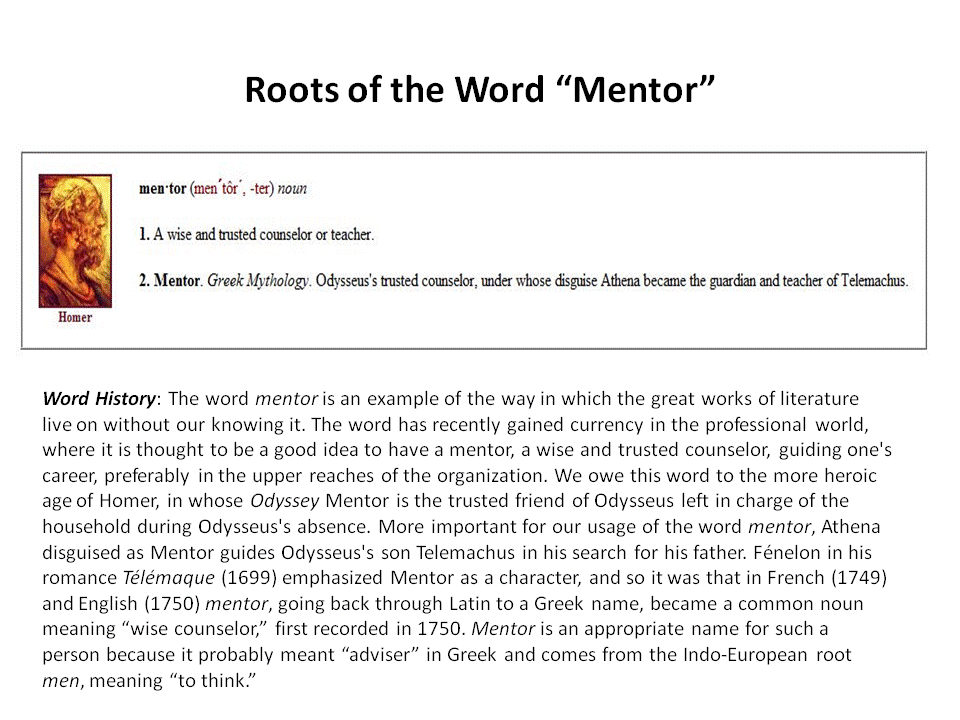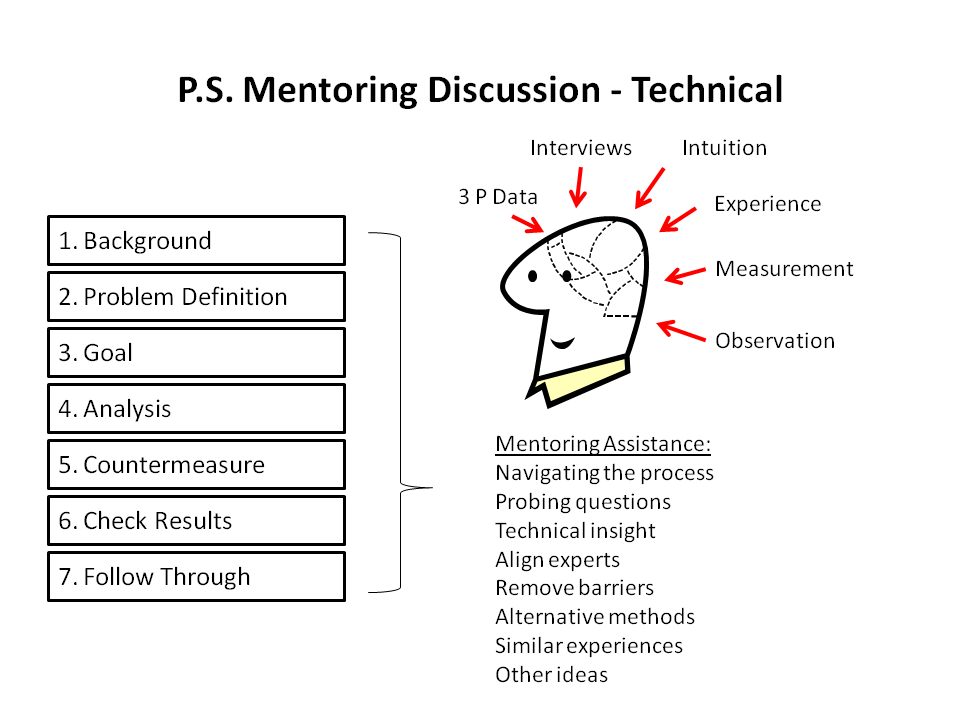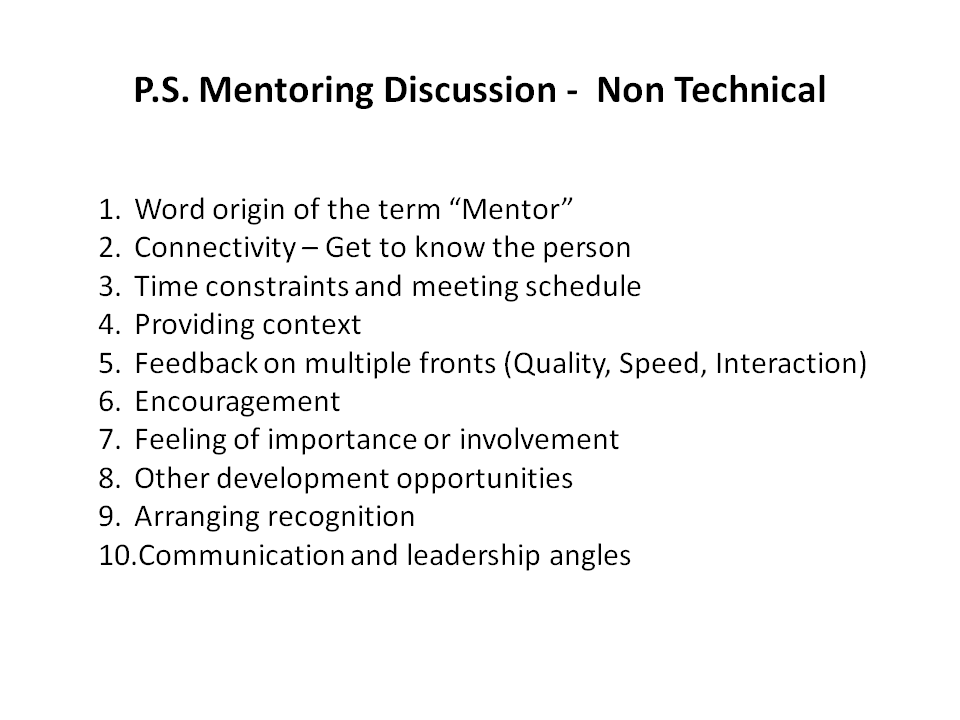In general I like to think that there are three invisible pillars for A3 reports. One pillar is good old fashioned problem solving. A second pillar is communication and collaboration. A third pillar however is mentoring and advising people on A3 reports. So in addition to the recent points of communication advice I drafted for A3’s here are some follow up points I discussed with a client about the topic of mentoring. It is difficult enough to author a good A3 report but it is also challenging and rewarding to help people improve the quality of their reports. Here is my subjective list of things to look out for and keep in mind. I am sure there are other points as well these are just my initial thought starters for consideration.
First it is worth considering what is the definition of the work mentor. The word is actually an old Greek word and comes to us from Homer and the tales of the Iliad and The Odessy. Here is a short summary of the term from an on-line dictionary.
So the word mentor means wise and trusted counselor or adviser and I like to relay that it means to help people think. It does not mean telling them what to do or providing answers. A good mentor is someone that can help you think your way through a problem or difficult situation in a meaningful manner. At least with regards to mentoring and A3 reports I like to think of it that way.
In terms of general advice I break down Problem Solving / A3 Mentoring into technical and non-technical elements. First here is a list of the more technical elements for consideration.
Included in this discussion I suggest that mentors help the learner navigate the problem solving process in an efficient and results oriented manner. Don’t get hung up on making people just fill out the box. Dig deeper and understand what is behind the steps, why they are important, and how to best accomplish them in different circumstances.
Secondly I suggest asking probing questions to help people see their way though the problem solving process. Toyota is well known for the “5 Why” process for example. It is not known for the “5 What to Do’s”. Asking why and helping people define problems, isolate root causes, establish countermeasures, and determine check methods is part of being a good mentor.
Thirdly although I emphasize asking probing questions I also realize there is a time and a place for good old fashioned technical insight. If you are the subject matter expert on some topic of course share that insight and don’t make people waste their time reinventing the wheel. Summarize what you know and share that as a starting point for discussion.
Fourth if there are various experts in the company who need to be consulted I think it is best to help organize and align those experts for the person doing the problem solving work. Often people new in the organization or new to a division don’t know who all the various experts are so give them some help in identifying those people and setting up meetings.
Fifth there will often be barriers that come up in the process of problem solving. A good mentor is someone who can be helpful in removing those obstacles or barriers. For example maybe it is tough to access data. In this case help the person in question get access to the proper data so that analysis can proceed.
Sixth I like the Japanese expression that translate roughly as “a fool knows one way of doing things…an expert knows many”. The mythical warrior Benke never lost a battle because he knew how to use all his fighting tools. He always selected the right tool for the situation and won his battle. From this inspiration Prof. Kaoru Ishikawa created the 7 QC tools for problem solving. A good mentor knows when the current approach is not working or might have limits and should provide some advice on alternative methods of techniques to employ.
Seventh feel free to share similar experiences with the person that you are mentoring. Sometimes it is just good to know that I am not the only person who has gone down this part and struggled, etc. A few words of encouragement on similar tactics or methods can go a long way some times.
Lastly since this is not a completely exhaustive list use your instincts and come up with other good ideas and suggestions. Every situation is different and what is appropriate for one learner may now work for another. Which leads me to some non-technical advice for problem solving mentoring as well.
In the course of problem solving mentoring here are a few things to keep in mind. Number one is to always remember the roots of the word mentor and always aspire to help people think. While doing this however take the time to get to know the person if you do not know them well already. Different people learn different ways and respond to different methods. Try and learn what works best for the person you are mentoring. Thirdly I think it is a good ideas to have some discussion about availability and time constraints. Are you going to meet in person for an hour per week? Or does ten minutes per day make more sense, etc.
I think a good mentor also always helps keep things in context. Why is this problem being worked upon? Why is it important for the company or for the learner. These sorts of contextual points are often important for the learner to hear. Giving feedback depends upon the learner and their ability and desire to hear what you are going to way. No everyone is open to feedback so handle this area carefully. If you are in a position to provide honest feedback however I’d think of the following three dimensions for starting points. How well is the quality aspect of the problem solving process working – are we employing the right methods and obtaining results. If not then why not? How fast or expedient is the process going? Just solving the problem is not good enough. We must strive to become efficient problem solvers as well. Additionally how well is this person communicating and interacting with others. Are people open and willing to help them solve the problem or are they reluctant to get involved? These are just some initial areas for discussion and there are many more as well.
At times problem solving will get bogged down especially on more difficult problems. Be prepared to provide encouragement and motivation if necessary. Sometimes like Thomas Edison one said genius is one percent inspiration and 99 percent perspiration. At times a good mentor has to help people stay the course and “perspire” some more until the problem is solved. On a slightly different vein it is also important to help people see their involvement in the big scheme of things and to feel somewhat important. Not every problem is the most difficult or important in the company but still we can emphasize what is important or significant about this particular problem.
In the course of problem solving it is nice to be on the look out for various other development opportunities. If there is a good chance to practice communication skills by presenting to another group, or if using certain techniques will help develop someone better for the future please remember to suggest those items as they occur. Similarly when a situation warrants the attention a good mentor should help if possible in arranging recognition for the person working on the problem. In particular this is important at the end of any A3 report of problem solving process.
Lastly I like to remind people that problem solving, leadership, and communication are all mutually reinforcing patterns. The better you are at communication the better you are at leading. The better you are at problem solving the better you are at leading, etc. Don’t think of mentoring problem solving in the narrowest sense. Keep in mind other angles that apply as well.



